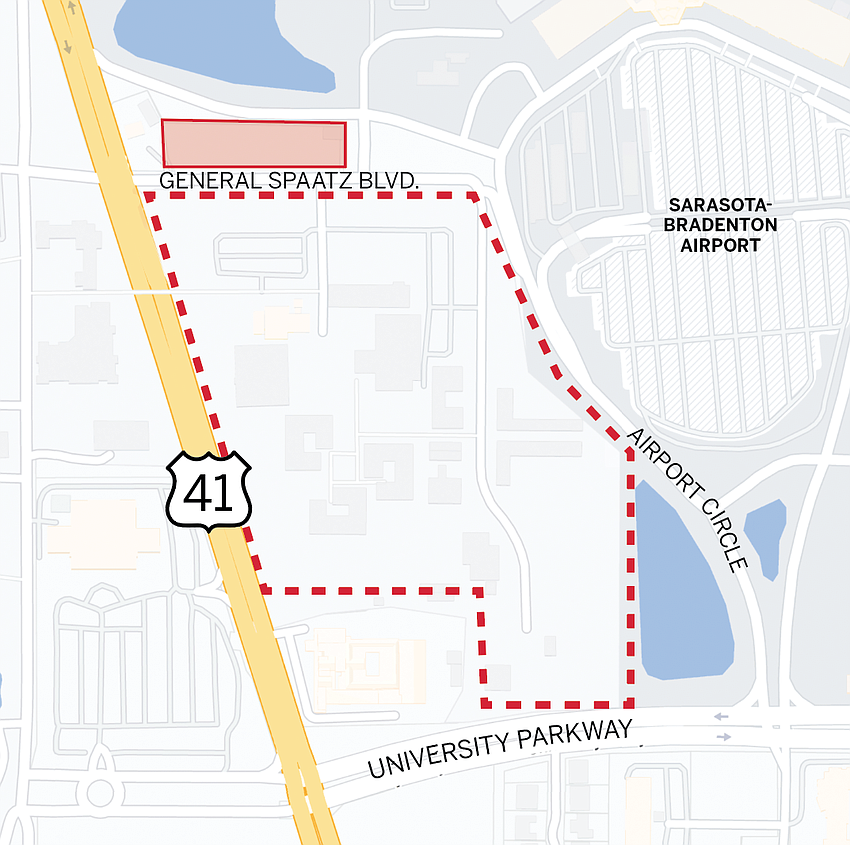- April 26, 2025
-
-
Loading

Loading

In the weeks since the Federal Aviation Administration informed Sarasota-Bradenton International Airport it would not approve the sale of 31 acres of leased land to New College of Florida, airport President and CEO Rick Piccolo has received apologies from agency management over the way the petition was handled and the backlash that resulted.
This week, Piccolo sent a rebuttal to the agency regarding the findings made by the Orlando Airports District Office that led to the denial, one that contradicts many of the claims by that office.
Chief among them was that the FAA had no prior knowledge of the presence of New College dorms, classrooms and other facilities on the property leased to the college by the airport, and that those uses were not approved by the agency.
In the letter sent to Steven Hicks, director of the Office of Airports Southern Region in College Park, Georgia, Piccolo referenced multiple historical documents that show the FAA had approved the New College leases and subsequent prior land sales to the school dating to the 1960s.
Essentially, Piccolo said, the FAA didn’t do its homework.
“I've known Steve Hicks and ATO (Air Traffic Organization) manager now for a long time and I talked to them on the phone, and frankly they were apologetic about how this came out,” Piccolo told the Observer. “But it doesn't change the fact that the damage is done and that we've got to defend ourselves.

Piccolo said the wording of the denial had tarnished his reputation and that of Sarasota-Manatee Airport Authority Board members with local media reports calling the SMAA “political cronies” and that the deal was driven by political motivations.
“This is false and patently unfair to the airport and the board members who now must not only endure these false allegations, but are asking how the airport can respond. Naturally, it is incumbent on my position to provide the response,” Piccolo wrote.
In his rebuttal, Piccolo attached an exhibit outlining multiple interactions between the airport, New College and the FAA that prove that not only was the agency aware of New College and its uses, but that it approved them.
He wrote, “Documents confirm not only was the FAA aware of the New College lease, but that Mr. David C. Kelly, who was the FAA District Airport Engineer in the Miami Area Office at that time, actually attended the SMAA Board meeting in Sarasota on Nov. 6, 1963, to advise the board on how to comply with FAA policy in regard to the proposed assignment of lease to New College covering the initial 20.436 acres, and on March 23, 1964, he wrote a letter expressing no objection to the assignment.
“Furthermore, on April 27, 1966, Mr. Max H. Bard, Chief, Airport Branch of the Miami Area Office of FAA, wrote a letter to the airport manager suggesting specific provisions that should be included in the lease of the additional 13.5 acres of the college.”
The documents also showed that the agency had no objection to the use of the land for classrooms provided it complies with local zoning, that it meets the approval of the airport authority and that proceeds be used only for the operation, maintenance and improvement of the airport.
Piccolo wrote, “To state that the FAA had no knowledge of New College's configuration and facilities, given the use and leases were approved by the Federal Aviation Agency in 1964 and 1966, direct license agreements between FAA and New College existed in the 1970s and 1980s, Master Plan and ALP (airport layout plan) documents were reviewed and approved by the FAA since the 1980s and as recently as 2021, and the approval of a similar land sale to New College for expansion of the campus by the FAA Orlando ADO in 2007 make the assertion that FAA had no knowledge of the existence of New College quite incredible.”
Piccolo also disputed the agency’s characterization of the appraisals to determine the value of the land, which were shipped separately in two parts. The FAA made its determination that the land was undervalued based on the appraisal of only eight of the 31 acres. The remaining appraisal details, Piccolo told the Observer, had likely been languishing on a retired manager’s desk. He said a courtesy call he never received would have clarified that matter.
“There were two separate appraisals of hundreds of pages of the 30 acres,” Piccolo said. “The first package I sent to the Orlando ATO manager, who retired a couple of days after we sent it. My guess is it got lost in the transferring of records from one office to another office, and instead of calling and saying there's only an appraisal here for eight acres, are we missing something, they were just like, ‘Oh well. You didn't submit it.’ Those are the things that are disappointing.”
Piccolo doesn’t expect the miscommunications will change the minds of FAA management with regard to the sale, but the overlooked information that it had previously approved the very uses the agency claimed to prohibit on adjacent land, and an appraisal report on the entire acreage, will bolster the airport’s case.
“I think we provided a tremendous amount of detailed justification,” Piccolo told the Observer. "I'm sure that there will probably be a request to meet, which I've been requesting from the start because it was so much documentation to have to present.”